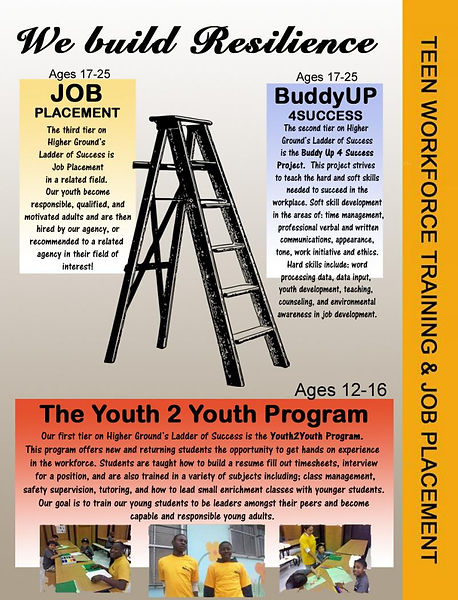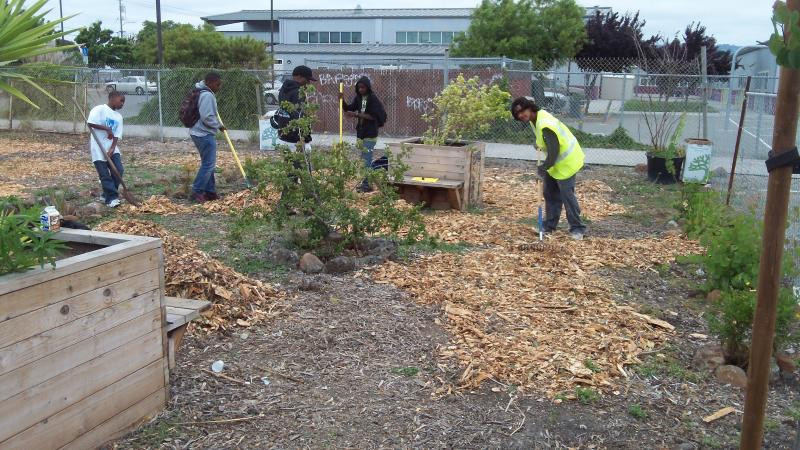
TEEN WORKFORCE PROGRAM
Teen Workforce Program
Description
Higher Ground is committed to helping our youth learn valuable tools that will train them to be productive members of society. Our Teen Workforce Program focuses on three different age groups, each group is a stepping stone to the next level of job training.
The program is designed to help students between the ages of 11-25 find their strengths and talents. We also encourage them to be influential peer leaders. We push them to choose a career that strikes their passion and is relevant to their community.
Goal
We aim to develop culturally competent Individuals that will succeed in the field of youth development and beyond.
Objectives
Our objective is to teach students these skills though weekly health and professional development sessions.
Benefits
-
Provide students wit small-group instruction
-
Administrative duties
-
community service hours
-
Letters of recommendation for college/ universities and job/career opportunities
-
Internship Opportunities for college graduation hours
-
Summer Job placement
-
Financial ad workshop
-
Resume building
-
Senior projects
-
Service learning projects
-
Lead enrichment classes
-
Bi-weekly professional development workshops and learning to lead peer workshops on various health topics
Outcomes
Students are expected to perform what they learn from each training and on the job coaching. They are also expected to lead health discussions amongst their peers throughout various events.
We Build Reselience
For more information on how the program is structured, and to learn about our three tiers within the workforce, refer to the image below.

College tours
A huge part of being in the Peer Leadership Workforce Development Program is learning about academic preparedness by participating in our structured college tours. During these tours, we are able to expose our participants to career options and potential majors. They are able to see campus life, meet administrators, dine in the campus cafeteria, peek at the dorms, and learn about what it takes to succeed in these academic spaces.



Service Leadership Learning
Job skills in the areas of project management, engineering and environmental science. In Addition, durning each event the WFD organize a kid zone for all youth to participate. The kid zone is made up of jumpers, face painting, slime making, organized games, snow cones, popcorn, hotdogs, and much more. All proceeds go to the youth workers who participate to teach them the importance of entrepreneurship and planning.

The San Leandro Creek Project

Brookfield Green Way Project
Opportunities For Professional Engagement
A huge part of being in the Peer Leadership Workforce Development Program is learning about academic preparedness by participating in our structured college tours. During these tours, we are able to expose our participants to career options and potential majors. They are able to see campus life, meet administrators, dine in the campus cafeteria, peek at the dorms, and learn about what it takes to succeed in these academic spaces.


Opportunities For
Innovative Community Learning
This year, The All Bay Collective (ABC) Design Team met with our Workforce Development (WFD) program to discuss possible solutions for sea level rise in East Oakland and the impact it will have on our community. This opportunity to learn from local community organizations presents our students with a unique partnership to enhance their critical thinking skills. The WFD students were able to present their ideas as well as hear what the future may hold for the city of Oakland.
The All Bay Collective (ABC): is a diverse group of locally-based/globally experienced professionals, academics, students, and policy makers. We have come together to fuse science, design excellence, academic leadership, community outreach, and business innovation to make our Bay Area more responsive to the people who live here and sensitive to the environments we share.
Youth Activism For Change
The 14th annual California Afterschool & Summer Challenge (ASK) is another opportunity for youth to be a part of the political process. Organizations have the opportunity to help ensure that all young people have access to quality programming that will keep them off the streets and in safe, engaging spaces. This year the WFD program attended the all-day conference, rally, and march along with 250 other organizations across Ca. Our youth were able to lobby ASM Skinner and ASM Bonta, and introduced Senator Eggman to the main stage!
The ASK and our youth participants were lobbying in support of the following propositions which would increase funding for Afterschool & Summer programs:
Prop. 98 Budget Request for ASES
-
$76.3 million annual increase from Prop. 98 - $49 million – remaining balance of last year’s request to keep pace with the current state minimum wage ($11). - $27.3 million to account for next state minimum wage increase effective 1/1/19 ($12).
-
Would bring state funding to an average of $9.25 per student per day.
-
Budget request heard by Assembly and Senate Budget Subcommittees on Education; request held open.
AB 1744 (McCarty): After School Programs
-
Allows tax revenue from Prop. 64 (Adult use of Cannabis) to be used for afterschool programs.
-
Afterschool programs were promoted in Prop. 64 campaign ads and ballot arguments as a beneficiary of the funding. “Proposition 64 generates a billion in new tax revenues for California to fund afterschool programs and job training and placement initiatives.” – Revenue
-
Passed Asm. Education, Asm. Health, Asm. Appropriations with unanimous support.













